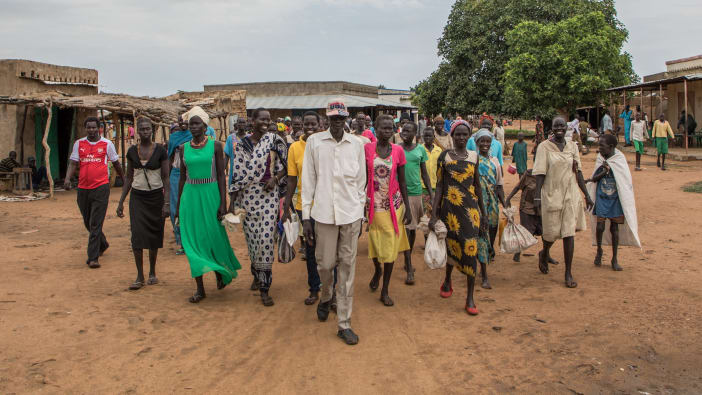
Articles
Corruption in our societies
Today, in Latin America as elsewhere, greed and corruption allow huge amounts of money to fall into the hands of just a few people, while most people become increasingly poor. Today, we are so used to corruption at every level that we may no longer be shocked by it – nor do we always emphasise that it is sinful
2003 Available in French, English, Spanish and Portuguese

From: Financial stewardship – Footsteps 57
Practical advice on managing money at home and in small organisations

Regular Bible study helps Christians to avoid adopting the corrupt ways common in our societies - Photo: Mike Webb/Tearfund
Today, in Latin America as elsewhere, greed and corruption allow huge amounts of money to fall into the hands of just a few people, while most people become increasingly poor. Today, we are so used to corruption at every level that we may no longer be shocked by it – nor do we always emphasise that it is sinful.
Traditional methods of exchanging work for food, or bartering different goods, now rarely take place. Our societies worship two idols – money and the market system. These benefit those who are privileged, while poorer people are marginalised. Obtaining money or riches now seems to take priority in all areas of life. The result is that more and more money and services benefit a smaller and smaller number of people.
Corruption takes places within both public and private services. Examples of corruption include the cancellation of fines, illegal commission, keeping false accounts, and false projection of share performance and profits. Other illegal ways of gaining large amounts of money can include drug trafficking, human trafficking (whether for emigration or prostitution), selling political favours and tax evasion.
Men and women who work honestly throughout their lives will rarely make large fortunes. What is the real purpose of wealth? What social functions should money provide? What does the present unequal world situation tells us as Christians?
The parable of the ‘rich fool’ in Luke 12 tells the story of a selfish man who hoarded grain in his barns. He took the cereal out of circulation and as a result may have caused a shortage of basic food, linked to a rise in the price. He probably planned to later sell the grain at an increased price. His behaviour was based on speculation in order to make more money from the grain. What distinction should we make between his hoarding of grain and the good practice of farmers who avoid selling all their grain at harvest time when prices are very low?
Proverbs 11:26 tells us that hoarding is wrong: ‘People curse the man who hoards grain, but blessing crowns him who is willing to sell.’
The Apostle James tells us in James 5:4 that, ‘The wages you failed to pay the workmen who mowed your fields, are crying out against you. The cries of the harvesters have reached the ears of the Lord Almighty.’ When do people work without reward today? In what situations might people be crying out for fair pay in our own societies?
Just because corruption is common in our societies, does not mean that it has any biblical justification or that the Lord will overlook it for the sin that it really is.
This article is adapted with thanks from Globalizar la Vida Plena, Ediciones CLAI, 2002. This is one of a series of educational materials published by the Faith, Economy and Society Programme. Their address is Programa de Fe, Economía y Sociedad, CLAI, Inglaterra N32-113 y Mariana de Jesús, Quito, Ecuador
Discussion questions
- What characteristics of the ‘rich fool’ might be found in our society today?
- In what ways do people gain money illegally today?
- Do we see any of these in our own organisation? What can we do about it?
- What values does the gospel call us to?
- What activities help to destroy our society? Which of these affect the poor and the marginalised?
- How can we help to change the basic values of the current economic system?
Similarly Tagged Content
Share this resource
If you found this resource useful, please share it with others so they can benefit too.

Subscribe to Footsteps magazine
A free digital and print magazine for community development workers. Covering a diverse range of topics, it is published three times a year.
Sign up now - Subscribe to Footsteps magazine





